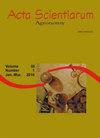Accuracy of DRIS and CND methods and nutrient sufficiency ranges for soybean crops in the Northeast of Brazil
IF 1.2
4区 农林科学
Q3 AGRONOMY
引用次数: 0
Abstract
This study aimed to evaluate the nutrition of commercial soybean crops in an agricultural frontier region using the diagnosis and recommendation integrated system (DRIS) and compositional nutrient diagnosis (CND) methods, as well as identify sufficiency ranges. The study was performed by collecting leaf samples (third trifoliate leaf without petiole) at flowering from commercial soybean crops in the states of Piauí and Maranhão, Brazil, and evaluating the crop yield by analyzing macro- and micronutrients in the plant tissue of 98 samples. The DRIS and CND methods were applied based on the cataloged data, followed by the generation of norms, analysis of relationships between yield and nutrients (selecting high-yield crops by the cumulative function of the data), generation of sufficiency ranges, and comparison of methods. The relationships obtained by the DRIS and CND indices with the yield and nutrients were significant, indicating that both methods can be employed for the evaluation of leaf nutrients in soybean. The sufficiency ranges from the DRIS and CND methods presented superior nutrient ranges in relation to the values proposed in the literature for macronutrients, except for nitrogen, and greater range amplitudes for micronutrients.巴西东北部大豆作物的DRIS和CND方法的准确性和营养充足范围
本研究旨在应用诊断与推荐集成系统(DRIS)和成分营养诊断(CND)方法对某农业前沿地区商品大豆作物的营养进行评价,并确定其充足范围。该研究通过收集巴西Piauí和maranh州商品大豆作物开花时的叶片样本(第三个没有叶柄的三叶叶),并通过分析98个样本的植物组织中的宏量和微量营养素来评估作物产量。基于已编目的数据应用DRIS和CND方法,然后生成规范,分析产量与养分之间的关系(通过数据的累积函数选择高产作物),生成充足范围,并比较方法。DRIS和CND指标与产量和营养成分的关系显著,表明两种方法均可用于大豆叶片营养成分的评价。DRIS和CND方法的充足范围与文献中提出的常量营养素(氮除外)的值相比具有优越的营养范围,而微量营养素的范围幅度更大。
本文章由计算机程序翻译,如有差异,请以英文原文为准。
求助全文
约1分钟内获得全文
求助全文
来源期刊

Acta Scientiarum. Agronomy.
Agricultural and Biological Sciences-Agronomy and Crop Science
CiteScore
2.40
自引率
0.00%
发文量
45
审稿时长
>12 weeks
期刊介绍:
The journal publishes original articles in all areas of Agronomy, including soil sciences, agricultural entomology, soil fertility and manuring, soil physics, physiology of cultivated plants, phytopathology, phyto-health, phytotechny, genesis, morphology and soil classification, management and conservation of soil, integrated management of plant pests, vegetal improvement, agricultural microbiology, agricultural parasitology, production and processing of seeds.
 求助内容:
求助内容: 应助结果提醒方式:
应助结果提醒方式:


